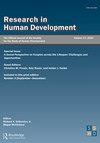SPENDING WELL: HOW TIME PERSPECTIVES IMPACT CONSUMER VALUES AND FINANCIAL DECISIONS AMONG MIDDLE-AGED ADULTS
IF 1.4
4区 心理学
Q4 PSYCHOLOGY, DEVELOPMENTAL
引用次数: 4
Abstract
The current research extends the time perspective literature by exploring the relationships between time perspectives and financial outcomes across several adult age groups. In combining various demographically diverse samples, our study includes a total of 9,065 adults that completed some form of the Zimbardo Time Perspective Inventory (ZTPI). We found that people who are Future-oriented tend to have more responsible financial lifestyles. On the other hand, Past-Negative, Present-Hedonism, and Past-Fatalism orientations are associated with more detrimental financial lifestyles. Thus, the greater the deviation from a balanced time perspective middle-aged adults were, the (1) more they reported being materialistic, (2) more impulsive, compulsive, and conspicuous they were when shopping, and (3) less financially secure they felt. Also, our mediation models revealed that increased impulsive buying, compulsive buying, and conspicuous consumption partially mediated the negative relation between Past-Negative and financial security. However, decreased conspicuous consumption partially mediated the positive relation between Future and financial risk tolerance. We discuss potential ways to shape individual time perspectives, the developmental implications for time perspectives, consumer profiles, and well-being, as well as limitations.花钱得当:时间观念如何影响中年人的消费价值观和财务决策
当前的研究扩展了时间视角的文献,探索了几个成人年龄组的时间视角与财务结果之间的关系。结合不同的人口统计学样本,我们的研究共包括9065名成年人,他们完成了某种形式的津巴多时间视角量表(ZTPI)。我们发现,面向未来的人往往有更负责任的财务生活方式。另一方面,“过去-消极”、“现在-享乐主义”和“过去-宿命论”倾向与更有害的财务生活方式有关。因此,中年人越是偏离平衡的时间观,他们就越会(1)报告自己是物质主义者,(2)在购物时更冲动、更有强迫性、更显眼,(3)他们感到的经济安全感越低。此外,我们的中介模型显示,冲动购买、强迫性购买和炫耀性消费的增加部分地中介了过去消极行为与金融安全之间的负向关系。然而,炫耀性消费的减少部分中介了未来与金融风险承受能力之间的正相关关系。我们讨论了塑造个人时间观的潜在方法,对时间观的发展影响,消费者概况,幸福,以及局限性。
本文章由计算机程序翻译,如有差异,请以英文原文为准。
求助全文
约1分钟内获得全文
求助全文

 求助内容:
求助内容: 应助结果提醒方式:
应助结果提醒方式:


